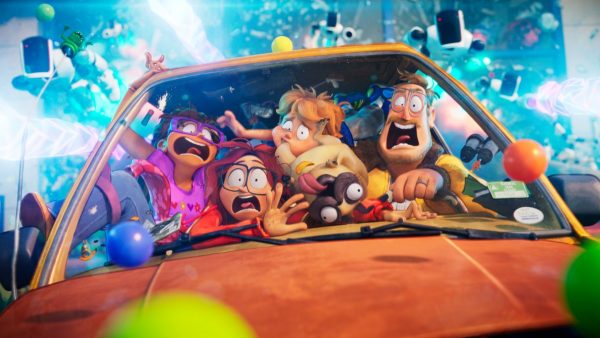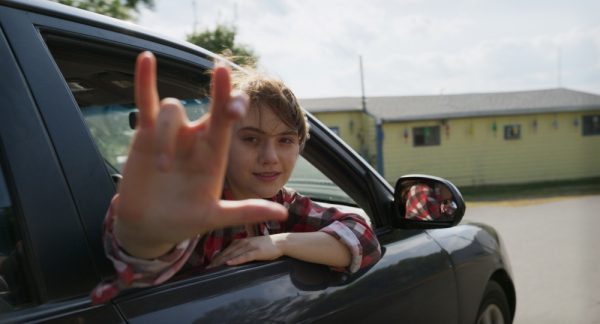20. The Last Duel

Ridley Scott shows no sign whatsoever of slowing down in his mid-80s while turning in one of his strongest directorial efforts in recent years with The Last Duel, no matter its appallingly unearned fate at the box office.
By turns a fierce, thrilling medieval epic and depressingly current treatise on women’s enduring pursuit to have their stories both heard and taken seriously, Scott’s film deals a gonzo helping of froth alongside its more trenchant social commentary.
Expertly bending the multi-perspective Rashomon technique to its will, The Last Duel lends each of the three central characters their own limelight, culminating in Marguerite’s (Jodie Comer) final, implicitly truthful testament.
Brilliantly acted by all – especially Comer and an hilariously campy Ben Affleck – while exuberantly staged by Scott and his crew, this is a rare glossy picture which doesn’t let its stylistic fineries detract from the searing, cutting quality of what it has to say.
Ridley Scott delivers one of his best works in years with this brutal, righteous, superbly acted historical drama.
19. Montana Story

Scott McGehee and David Siegel finally follow up their 2012 masterpiece What Maisie Knew with a brilliantly wrought tale of familial demons set across the backdrop of rural Montana.
Montana Story sees estranged siblings Cal Thorne (Owen Teague) and Erin (Haley Lu Richardson) reunited amid fraught circumstances, as they seek to reckon with their pasts and look forward to the future.
The narrative particulars aren’t majorly unique, but as a character study splashed across an eye-wateringly beautiful mountainous setting, and acted with such conviction by Teague and Richardson, it easily transcends its fair predictability.
Read my full review here.
18. Pleasure

Ninja Thyberg’s highly provocative directorial debut Pleasure was one of the most buzzed-about films from this year’s Sundance, and one can only imagine the headache distributor Neon would face trying to give it any sort of not-limited release (spoiler: they won’t bother).
A matter-of-fact drama about a 19-year-old Swedish woman (a brilliant Sofia Kappel) arriving in Los Angeles to start a career as a porn star, Pleasure is at once an astonishingly honest look at the commodification of sexuality in the modern world, and a rich character study of a people too often marginalised by both cinema and society.
It goes without saying that Thyberg’s graphic approach to nudity will immediately turn off many, but the full-frontal imagery rarely feels like it’s supposed to shock, simply to illustrate what sex workers put themselves through on a daily basis.
The result is a film that pulls off the nimble feat of being sex-positive and yet casting a critical eye upon predatory porn empires that largely still operate unchallenged today.
Read my full Sundance review here.
17. Flee

While technically a documentary, Jonas Poher Rasmussen’s Flee plays so ingeniously with the very form of the “genre” that its designation isn’t quite so straight-forward. Not merely a rare animated doc in the vein of Waltz with Bashir, Flee is also deeply interested in the unreliability of its focal subject and his status as a storyteller in his own right.
Rasmussen spends the film speaking with a man known only as Amin, who chronicles his torrid, dizzying experiences escaping the mujahedeen in Afghanistan some 20 years prior, a feat which saw him ping-ponged around the globe.
Amin’s collection of harrowing tales make for massively sober viewing, their power only emphasised through the heightened medium of animation, lending an almost mythic quality to the gut-wrenching journey he, his family, and others like him have faced.
As much as “trauma” has quickly become a tired critical buzzword in recent times, Flee truly is a towering depiction of its lingering effects, namely the myriad means through which it can distort a person’s sense of self.
Read my full Sundance review here.
16. The Mitchells vs. The Machines

In a sea of conventional, reliable animated films, The Mitchells vs. The Machines was a massive breath of fresh air; a seemingly typical road movie comedy packed to the gills with Mad Libs-style asides, eye-meltingly left-field visuals, and a wonderful cast of brilliantly-voiced characters (perhaps none better than Olivia Colman’s high-strung virtual assistant PAL).
Where else can you witness a giant Furby wreak havoc on a family of oddballs tasked with saving the world from technocentric calamity? It’s just one of the many enormously entertaining moments in a film that bleeds invention from every single pore.
At once irreverent, spritely, and moving, The Mitchells vs. The Machines skirts the treacly, arch sentiment of “family-friendly” fare to deliver an animation as profound as it is stylistically audacious.
15. CODA

If films are often criticised for their predictability, Sian Heder’s terrific dramedy CODA is a staggering antidote to that all-catch put-down.
Few will be surprised by how this coming-of-age tale turns out, but the unique lens through which it’s shone, and the superb ensemble cast, ensure it’s a dew-eyed crowd-pleaser with real lingering heft.
Emilia Jones is phenomenal as Ruby, a Child of Deaf Adults (CODA) who finds her far-flung aspirations clashing with her all-deaf family’s struggles to continuing operating their fishing business without her.
There’s so much here that, with lesser writing and performances, could be easily written off as mawkish or treacly, but the refreshing, fully earned earnestness packs a wild emotional punch, undeniably aided by the specificity of characters too-rarely represented on-screen.
Read my full review from Sundance here.
14. Wild Indian

Lyle Mitchell Corbine, Jr. immediately earmarks himself as a director to watch with Wild Indian, a savage dramatic thriller with clear literary influences centered around two men forced to confront a violent act from their pasts.
As protagonist Michael, Michael Greyeyes gives a memorably steely performance, incorporating layers of self-loathing and trauma – related to both the aforementioned event and consequent repression of his heritage – into a rich, unconventional portrait of masculinity in crisis.
It’s easy to appreciate why many may find the narrative too bleak to stomach, but for those prepared to follow it to its conclusion, Wild Indian is a riveting neo-noir that’s not easily forgotten.
Read my full review from Sundance here.
13. Language Lessons

Natalie Morales made a mighty directorial debut in Language Lessons, a sweet and moving tale of friendship that, despite not mentioning the pandemic even once, is inextricably intertwined with at-home lockdown restrictions.
Filmed entirely over Zoom, Morales’ film chronicles the fast-growing digital co-dependence of a Spanish teacher (Morales) and her student (Mark Duplass) as each suffers through major personal turmoil.
Avoiding the expected romantic throughline entirely and focusing purely on the moving platonic relationship between two people suffering through tremendous adversity while at great physical distance from one another, Language Lessons is a remarkable showcase for Morales and Duplass as both co-stars and co-writers.
Read my full review from SXSW here.
12. On the Count of Three

Jerrod Carmichael makes a startling, unforgettable directorial debut with this darker-than-dark comedy about two chronically depressed pals, Val and Kevin (Carmichael and Christopher Abbott), who enter a pact to shoot one another in the face before day’s end.
What follows is a daring and provocative commentary about merely existing in contemporary America; Carmichael perceptively takes to task the nation’s pathological obsession with guns, and on a broader global scale the inadequate attention paid to male mental health.
Carmichael and the ever-brilliant Abbott are unsurprisingly terrific here, making for an alternately entertaining and disconcerting pair of leads, whose central mission we can’t help but root against even as it seems so utterly set in stone.
Read my full review from Sundance here.
11. Playground

Few films have ever captured the casual brutality of the schoolyard better than Laura Wandel’s delicate-yet-honest 72-minute drama Playground.
Focused on two siblings struggling to deal with school bullies, Wandel’s film is at times discomfortingly intimate in its depiction of youthful cruelty.
Maya Vanderbeque, who plays young lead Nora, is an unforgettable presence throughout, her deeply expressive face put to affecting and highly expressive use.
Without providing easy answers for a problem society at large is still struggling to solve, Playground nevertheless shines an empathetic light on an everyday struggle, while also sensibly keeping the camera at child-height for the most part.
Read my full review from the London Film Festival here.
Click below to continue on to top ten…











